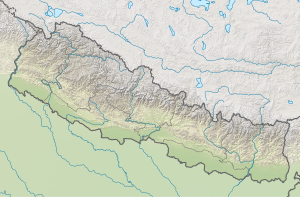Lungri Rural Municipality
Lungri (RM) लुङ्ग्री गाउँपालिका | |
|---|---|
| Coordinates: 28°16′N 82°46′E / 28.27°N 82.77°E | |
| Country | |
| Province | Lumbini |
| District | Rolpa |
| Wards | 7 |
| Established | 10 March 2017 |
| Government | |
| • Type | Rural Council |
| • Chairperson | Mr. Bharat Kumar Thapa |
| • Vice-chairperson | Mrs. Bhimkala Budhathoki Chhetri |
| • Term of office | (2017 - 2022) |
| Area | |
| • Total | 135.23 km2 (52.21 sq mi) |
| Population (2011) | |
| • Total | 23,631 |
| • Density | 170/km2 (450/sq mi) |
| Time zone | UTC+5:45 (Nepal Standard Time) |
| Headquarter | Wadachaur |
| Website | lungrimun |
Lungri is a Rural municipality located within the Rolpa District of the Lumbini Province of Nepal. The rural municipality spans 135.23 square kilometres (52.21 sq mi) of area, with a total population of 23,631 according to a 2011 Nepal census.[1][2]
On March 10, 2017, the Government of Nepal restructured the local level bodies into 753 new local level structures.[3][4] The previous Wadachaur, Pang, Sirpa, Harjang and Gumchal VDCs were merged to form Lungri Rural Municipality. Lungri is divided into 7 wards, with Wadachaur declared the administrative center of the rural municipality.
Demographics
[edit]At the time of the 2011 Nepal census, Lungri Rural Municipality had a population of 23,631. Of these, 99.4% spoke Nepali, 0.4% Gurung and 0.2% other languages as their first language.
In terms of ethnicity/caste, 46.7% were Chhetri, 31.6% Magar, 11.9% Kami, 3.1% other Dalit, 2.0% Damai/Dholi, 1.9% Sanyasi/Dasnami, 1.5% Gurung, 0.5% Hill Brahmin, 0.3% Majhi and 0.5% others.
In terms of religion, 96.6% were Hindu, 2.1% Buddhist, 1.2% Prakriti and 0.1% Christian and .[5]
References
[edit]- ^ "District Corrected Last for RAJAPATRA" (PDF). www.mofald.gov.np. Retrieved 17 July 2018.
- ^ "स्थानीय तहहरुको विवरण" [Details of the local level bodies]. www.mofald.gov.np/en (in Nepali). Ministry of Federal Affairs and Local Development. Retrieved 17 July 2018.
- ^ "New local level structure comes into effect from today". www.thehimalayantimes.com. The Himalayan Times. 10 March 2017. Retrieved 17 July 2018.
- ^ "New local level units come into existence". www.kathmandupost.ekantipur.com. 11 March 2017. Retrieved 18 July 2018.
- ^ NepalMap Demographics [1]
External links
[edit]


 French
French Deutsch
Deutsch

